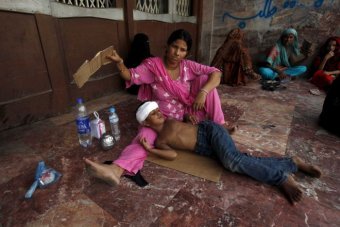More than 500 people have died from a three-day heatwave in southern Pakistan, officials say, as medics battled to treat victims after a state of emergency is declared in hospitals.
The majority of the deaths occurred in the port city of Karachi, Pakistan’s economic hub of around 20 million people, where temperatures reached 45 degrees Celsius at the weekend, said Sabir Memon, a senior provincial health official.
“The number of people who have died due to the heatwave in government hospitals is now more than 500. The death toll may go up,” he said.
The deaths came as the overwhelmingly Muslim country of around 200 million people observes the Islamic holy month of Ramadan, during which eating and drinking is forbidden from sunrise to sunset.
Semi Jamali, a doctor at Karachi’s largest hospital, said they had treated about 3,000 patients.
“More than 200 of them were either received dead or died in hospital,” he said.
Pakistan’s largest charity, Edhi Welfare Organisation, said their two morgues in the city had received more than 400 corpses.
Electricity shortages have crippled the water supply system in Karachi, hampering the pumping of millions of gallons of water to consumers, the state-run water utility said.
Pakistan’s meteorological office said temperatures remained around 44.5 Celsius in Karachi on Tuesday but forecast thunderstorms for the evening.
The provincial government, meanwhile, announced a public holiday to encourage residents to stay inside, an official said.
Many of the victims have been labourers who toil outdoors.
Some residents also took to hosing each other down with water to avoid collapsing from heatstroke.
Clerics urge people at risk to break fast
Tahir Ashrafi, a prominent Islamic cleric, urged those who were at risk of heatstroke to abstain from fasting.
“We [religious scholars] have highlighted on various television channels that those who are at risk, especially in Karachi where there is a very serious situation, should abstain from fasting,” he said.
“Islam has drawn conditions for fasting, it is even mentioned in the holy Koran that patients and travellers who are not able to bear fasting can delay it and people who are weak or old and are at risk of falling sick or even dying because of fasting should abstain.”
An official from the National Disaster Management Authority said heatstroke treatment centres would be established at all hospitals across the province to provide “emergency medicines for heatstroke victims”.
The deaths come a month after neighbouring India suffered a deadly heatwave with more than 2,000 deaths.
Hundreds of mainly poor people die at the height of summer every year in India, but this year’s toll was the second highest in the country’s history.
AFP

